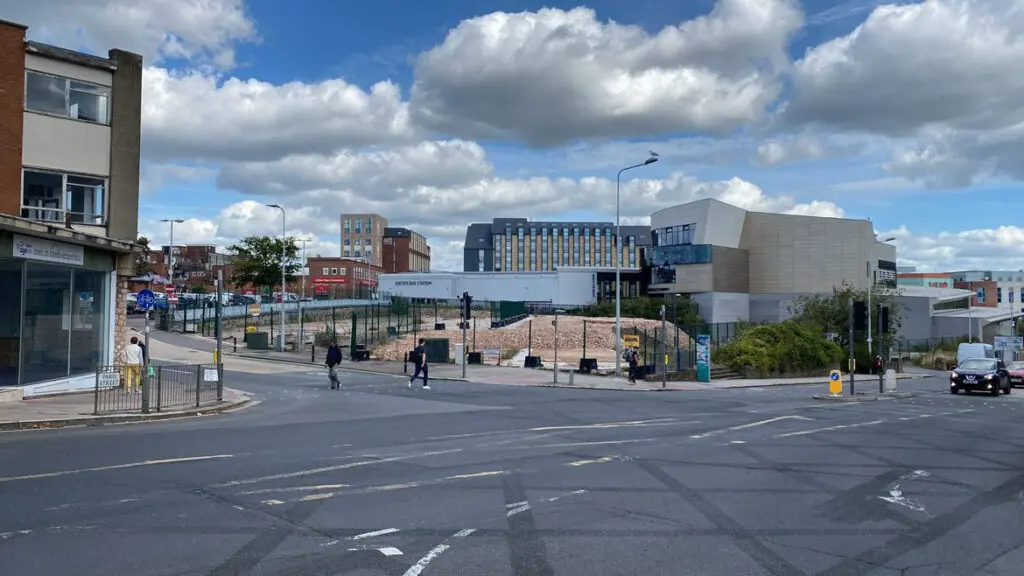
Over the course of its lifetime, Exeter’s bus station, located on Bampfylde Street, has been a subject of great contention. In 2019, the Council began works to demolish the original bus station founded in 1964. After initial delays, renovation was completed on part of the original site in 2021. This regeneration project was only a small part of a larger £300m redevelopment scheme known as ‘CityPoint‘, aiming to revive the area around the old bus station.
The scheme envisioned new housing, two new hotels, and the relocation of council headquarters. However, the road to renovation has been anything but smooth. In 2023, the council’s chief executive, Bindu Arjoon, revealed that due to difficulties finding anyone able to demolish the site within budget, demolition to the bus station would once again be delayed. Only in February 2024, after steadily increasing antisocial behaviour, would the Council have any joy as local contractor Wring Group, based at Sowton Industrial Estate, agreed to complete the work.
With the site now clear, it wasn’t long before controversy soon began circling the area once again. Despite original ideas for the site, including offices, a multi-performance venue, and built to rent homes on Sidwell Street, the Labour-led Council has proposed that the land should instead be repurposed as a car park. This proposal has been met with passionate reproval from the Exeter Green Party, who have expressed deep concerns for the impacts of this decision. Diana Moore, Exeter’s Green Party Leader, in particular, has highlighted both the social, economic, and environmental implications the party believes this decision will have upon Exeter City Centre and its residents.
As she told the BBC, it did not “make any financial sense” especially due to the fact that “Exeter city centre car parks are underutilised”, and the decision directly opposed the principles of St Sidwell’s Point which is “meant to be a showcase for sustainability and health.”
We should be focusing on bringing public transport back into public hands.
Thomas Richardson, Exeter Green Party Youth Officer
Exeter Green Party Youth Officer Thomas Richardson further echoed the sentiments of his fellow party member by stating that ‘there [are] no statistics which suggest that we need a new car park.” Passionate about decarbonising travel, Richardson emphasised how “we shouldn’t be encouraging cars to come into the city centre”. Instead, we should be focusing on “bringing public transport back into public hands” – a key facet of the Green Party’s proposal.
Yet, Exeter City Council’s transport objectives also highlight an awareness of the importance of sustainable transport. According to Exeter City Council’s transport objectives, they aim ‘to encourage and promote sustainable development, which will minimise travel and traffic generation.’ Having surveyed members of the Exeter University population, we can see how the Green Party are not the only ones that are perplexed on how to reconcile a car park with minimising traffic or sustainability. According to an anonymous respondent, “Turning an old bus station into a car park is going in the opposite direction to what is needed. We need more investment into public transport, bike usage, and walkability, not to facilitate and encourage unsustainable car travel.”
Concerns around the car park have also sparked uncertainty about other council promises. Part of the initiative proposed by the Council to reduce carbon emissions to net zero by 2030 is the reduction in vehicles around the city as well as other measures involving housing, energy, and procurement. It is clear that the introduction of a car park seems antithetical to the Council’s current goals. Both Richardson and Liberal Democrat Councillor Michael Mitchell, have expressed apprehension on how this will align with the Council’s plans.
In light of the conflict surrounding the plans for the site, the Green Party is leaning towards alternative solutions. Recognising that the site, as Richardson puts it, “could be an important thoroughfare from the bus station to Princesshay” coupled with the desire for the public to be front and centre on changes to their city, has prompted the party to open the floor to different ideas on how people would prefer the space to be used. While discussing different possibilities, Richardson highlighted that two major trends have been seen in the data. First was an urban park, which would allow for an increase in green space within Exeter.
As editors from the Exeposé discussed last year, despite Exeter being awarded the title of ‘greenest city centre’, an increase in student population and therefore large-scale developments has posed a significant threat to maintaining green spaces, making this a productive option. The second idea was a market space enabling local businesses to sell their produce and engage with the community.
It is clear to us that irrespective of whether the car park is built or not, transportation remains an issue of high importance. Our survey data highlights that although just over 50% of respondents held a negative stance on the possibility of a car park being built, we cannot ignore that some people feel that there is in fact not enough parking in Exeter and using the space for something is better than nothing at all. Richardson emphasised that the Green Party is not blind to the barriers posed by unreliable transport and that they recognise that there is a lot of opportunity that “the city does not take advantage of”. No matter how the site is used, only time will tell of its impact, so until then the question remains: urban regeneration or urban stagnation?


